LONDON: Speculation about Gaza’s post-conflict future has been rife in recent weeks, ranging from suggestions of a permanent Israeli takeover and the expulsion of the Palestinian population to a possible Arab-led peacekeeping force that would hand control to the Palestinian Authority.
Israel launched its military campaign to destroy Hamas in the Gaza Strip after the Palestinian militant group mounted its cross-border attack on southern Israel on Oct. 7, killing 1,400 and taking around 240 people hostage.
Hamas has been the de facto governing body in the Gaza Strip since 2007, when it ousted the Palestinian Authority from power. Primarily in Gaza, Hamas also maintains a presence in the West Bank, Palestinian refugee camps in Lebanon, and has a political office in Doha and a representation office in Tehran.
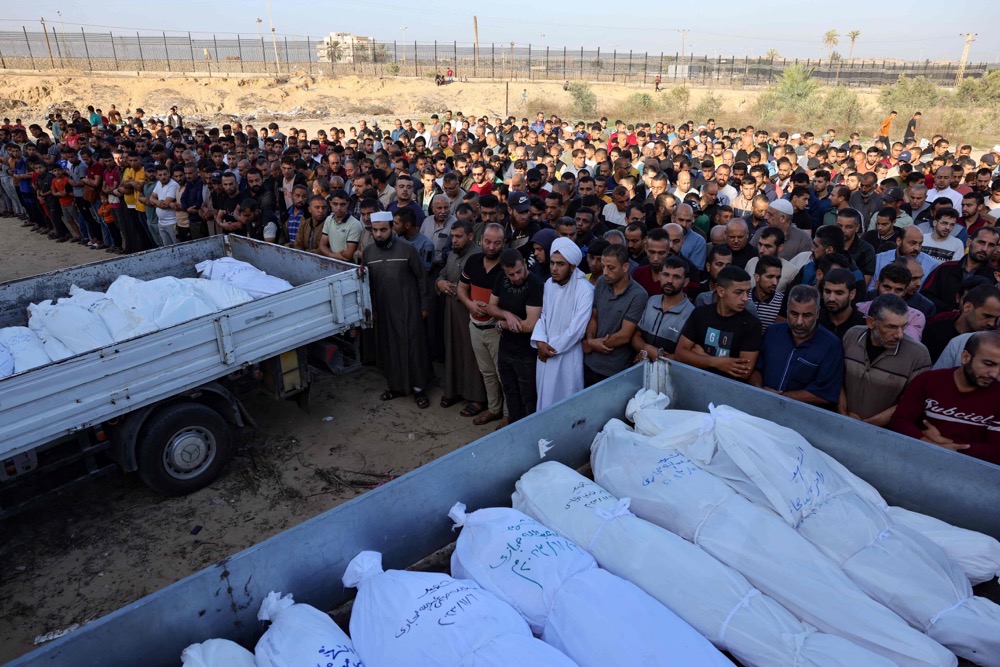
Palestinians pray near the bodies of members of the Hijazi family, killed in Israeli strikes in Rafah. (AFP)
After initial indications that Israel planned to fully occupy the Gaza Strip once Hamas had been unseated by the Israeli Defense Forces’ ongoing ground operation, the government since appears to have backtracked, likely under pressure from Washington.
Speaking to Fox News on Thursday night, Benjamin Netanyahu, the Israeli prime minister, played down the notion of an occupation, instead stressing the aim was to “demilitarize, deradicalize, and rebuild” the Gaza Strip.
His comments were a stark departure from just three days earlier when Netanyahu indicated occupation was, indeed, the aim, telling ABC News that Israel would have “overall security responsibility … for an indefinite period” in Gaza.
The apparent U-turn followed a strong rebuke from Antony Blinken, the US secretary of state, over the prospect of an Israeli occupation, with the senior diplomat telling reporters after G7 talks in Japan on Wednesday that neither Israel nor Hamas could be left to run Gaza.
During his Fox News interview, Netanyahu said: “We don’t seek to govern Gaza, we don’t seek to occupy it.” Instead he said Israel would have to find a “civilian government” to manage the territory.
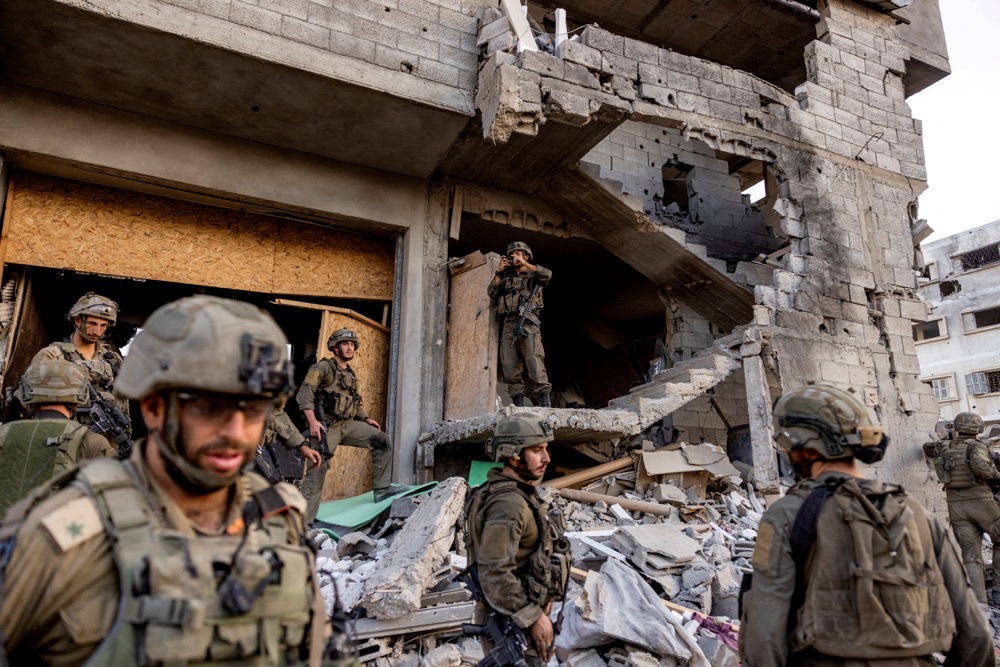
Israeli soldiers in the northern Gaza Strip. (Reuters)
Yossi Mekelberg, professor of international relations and associate fellow of the MENA (Middle East and North Africa) Program at London’s Chatham House, believes such uncertainty reflects the manner in which the conflict has been playing out more generally.
“You have to remember that this war was not planned by Israel; it started out of surprise. So, it is not surprising there is uncertainty over what comes next,” Mekelberg told Arab News.
“There are some right wingers in Israel who want to take Gaza and build settlements. In the Middle East I would never say never about anything, but I am not certain this is the intention. Settlements are very hard to remove and Blinken was clear over what would be tolerated.”
Indeed, US red lines are not limited to the question of occupation. As members of the Knesset pushed hard on the notion of allowing settlements in the West Bank to expand into Gaza, Blinken was clear there was to be “no forcible displacement of Palestinians from Gaza, not now, not after the war.”
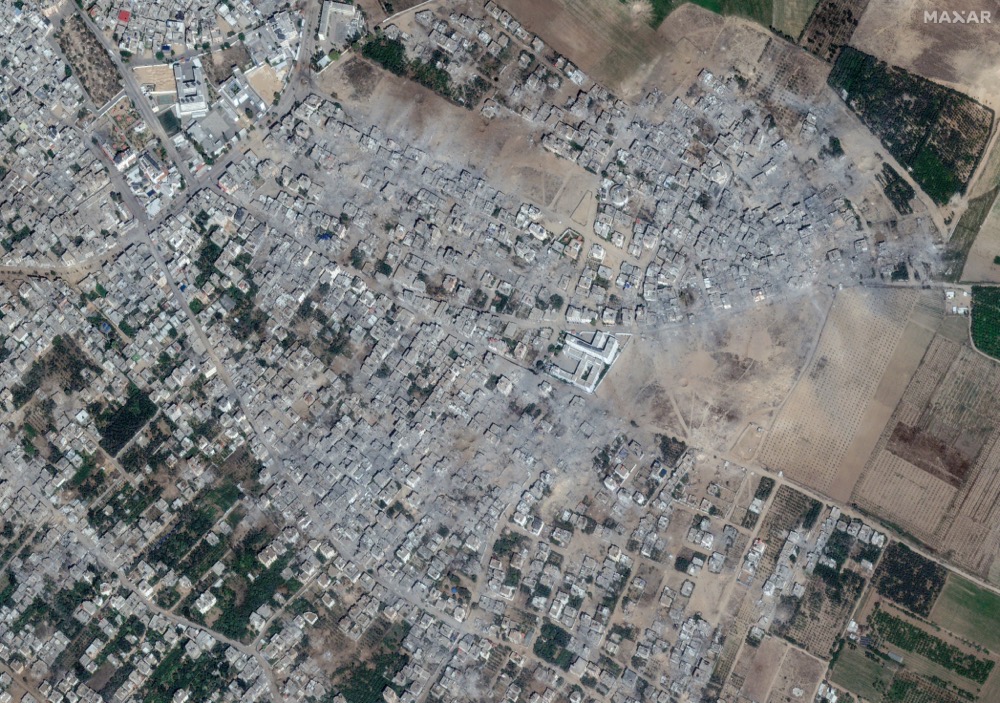
An overview of Beit Hanoun in Gaza Strip on October 21, 2023. (AFP/MAXAR)
Such forthright opposition to the removal of Palestinians from Gaza was welcomed by Mekelberg, but he acknowledged that the impact of these words was as indeterminate as Gaza’s fate.
“Whether or not Blinken’s comments are taken seriously in Israel or not is dependent on how much the Israeli government thinks the US really believes it or not,” he said.
“The US needs to make sure that this is its policy. Not only because it serves the US but because it serves Israel.”
Pushback from the US, for the time being at least, appears to be administration-wide. Blinken’s statement followed one issued on Tuesday by John Kirby, the White House national security spokesperson, who stressed that President Joe Biden did not believe an occupation of Gaza was the “right thing to do.”
On the potential for an occupation, Dr. Ziad Asali, founder of the non-profit American Task Force on Palestine, is circumspect. While Israel has “no benefit” in occupying Gaza, Asali believes it is still “likely to gain whatever it can in the interim.”
Asali was equally less certain over the longevity of the status quo, even after Blinken stressed on Wednesday that the current Hamas-Israel binary in Gaza could not be allowed to continue.
“Israel can barely manage the Palestinians presently under its control,” he told Arab News. “It is also now likely to face new immediate challenges that cannot be solved by military force alone. Judging by past experience, I suspect that the status quo could endure longer than people think.”
As for Israel “finding” a new civilian government, Mekelberg said it was “obvious” that there would be no place for Hamas in a post-conflict Gaza. Equally, though, he stressed the need for “parties that represent the population,” if the ultimate aim was to avoid a repeat of the Oct. 7 attacks.
“Both Gaza and the West Bank need to be governed by the same body,” he said. “Being split does not help anybody, and it perpetuates the situation. Now, we know that it will not be Hamas, as, Iran and maybe Qatar aside … no one will engage with them.
“So, what you need is a party that represents the Palestinians. Who that is remains uncertain and, in part, will depend on how the fighting is brought to a close.”

Orheen Al-Dayah, who was injured in an Israeli strike, has her wound stitched without anesthetic due to a dearth of the medication, at Al Shifa hospital in Gaza City. (Reuters)
Solutions beyond an Israeli occupation have included installing the Fatah-dominated Palestinian Authority. But given that Fatah was voted out by Palestinians in favor of Hamas in the 2006 legislative elections in the occupied territories, the legitimacy of Palestinian Authority’s rule remains in question. Furthermore, as Mekelberg put it bluntly, “they are not in the state to take over.”
The Palestinian Authority appears to think differently, but with an important caveat.
In a recent interview with the New York Times, Hussein Al-Sheikh, secretary-general of the Palestine Liberation Organization, said that were Washington to commit to a “full-fledged two-state solution,” the Palestinian Authority would be willing to take on the role of governing post-war Gaza.
Al-Sheikh said this would be dependent upon the US forcing Israel to abide by such an agreement — a scenario he believes the Biden administration is “capable” of achieving.
He is not alone in sensing an opportunity to renew efforts toward the two-state solution. Ehud Barak, the former Israeli prime minister, has also thrown his support behind the need to revive this initiative.
“I think there is a need in Israel, under the heaviest, most difficult conditions, never to lose sight of the objective,” Barak told Time magazine this week.
“The right way is to look to the two-state solution, not because of justice to the Palestinians, which is not the uppermost on my priorities, but because we have a compelling imperative to disengage from the Palestinians to protect our own security, our own future, our own identity.”
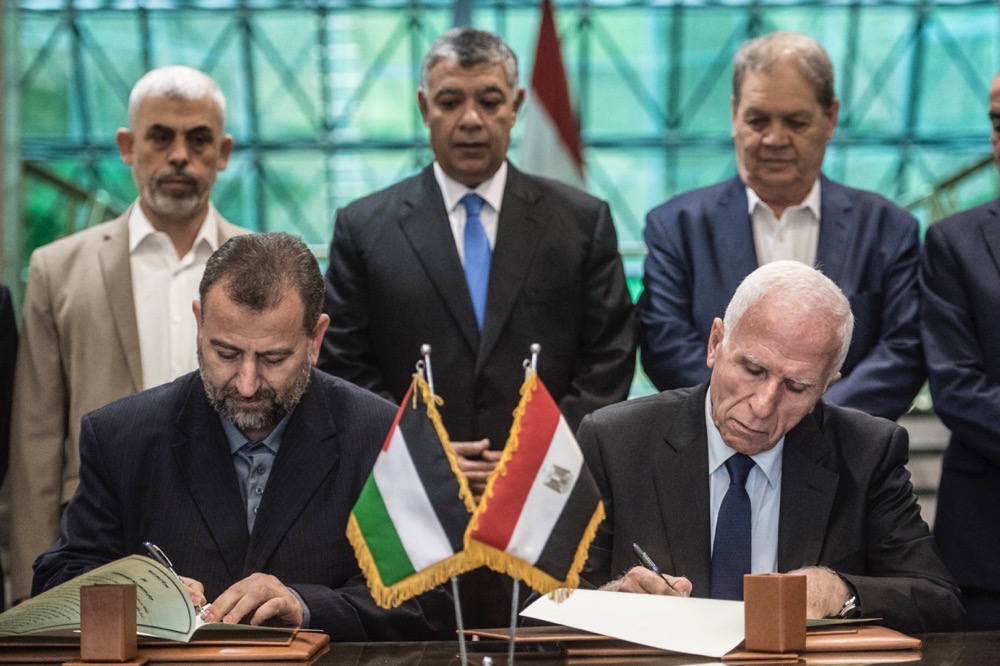
Fatah's Azzam Al-Ahmad (R) and Saleh Al-Aruri (L) of Hamas signed in 2017 a reconciliation deal at the Egyptian intelligence services headquarters in Cairo. (AFP/File)
Who precisely would serve as a unifying leader capable of bridging divisions among Palestinians remains an open question, although commentators have suggested someone of the stature of Salam Fayyad, the former Palestinian Authority prime minister.
In a recent tweet, Asali suggested that Marwan Barghouti, the jailed leader of the First and Second Intifadas, would be a suitably trusted candidate for the presidency of a unified Palestinian state should Israel agree to his release as part of a hostage exchange deal.
Beyond restoring the Palestinian Authority to power in Gaza, there have also been calls for an international peacekeeping force, an idea which has received some support from the US, with Kirby telling reporters aboard Air Force One on Wednesday that the administration was discussing what post-conflict Gaza should look like.
“If that means some sort of international presence, then that’s something we’re talking about,” he said, adding that there were “no plans or intentions” for US forces to be involved.
Asali said there is little appetite in Washington for the US to find itself “in another Middle East mess” that will demand more of the US president (Joe Biden) than he can deliver in an election year, hinting that a regional force may be required.
“Gaza and its leaders will soon be facing a huge humanitarian problem that will need to be solved by outsiders. The providers of that help would have more influence on Gaza than anyone else,” he said.
Without being drawn into specifics, he did not rule out the possibility of initiatives for strategic decisions on the Palestinian issue or the Gaza governance imbroglio being taken by a Middle Eastern country.
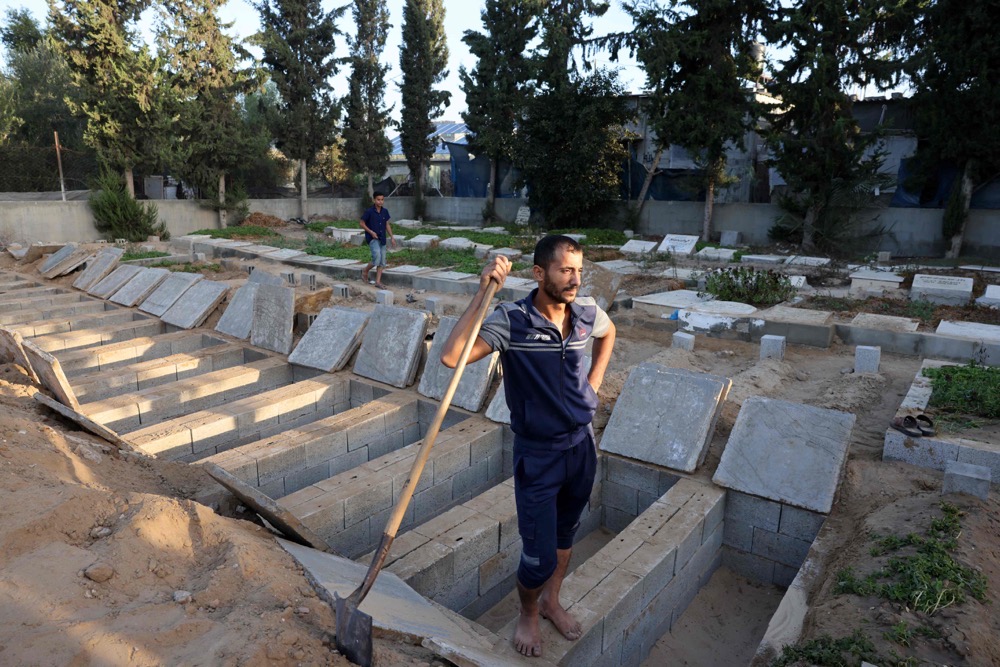
A man rests atop a row of freshly dug graves in a cemetary in Rafah. (AFP)
Asali is not alone in this view. One touted contender has been Egypt, but Mekelberg says officials in Cairo “do not want to do it.” While he “hopes it will be a regional grouping,” he suspects it will need to be “international,” warning that there will be significant work to do.“The first thing that whoever comes in needs to do is stabilize security and get infrastructure to a level where they can make sure enough aid is entering to provide what humans need,” said Mekelberg.
“After that, they will need to look at building bodies, and reconstructing the necessary institutions to run a state.”
















